Working with a First Nations Community
Background
One of ENRICH’s objectives was to gain an in-depth understanding of how to better support pregnant women in a large Cree First Nations community with the ultimate goal of improving pregnancy-related health by identifying new and innovative strategies. These strategies were designed with the intention of addressing the unique needs that these women and communities face due to cultural destruction, historical trauma, socio-economic inequalities, and other related factors.
An important theme of this community-based participatory research is understanding the kinds of support that Cree women and families need during pregnancy and postpartum; the barriers faced when accessing health care; and how family, community, and culture influence this process. ENRICH partnered with the communities of Maskwacîs in hopes of achieving these goals.
Maskwacîs is a rural community approximately 90 kilometers south of Edmonton, Alberta, within the area of Treaty Six. This community is collectively made up of four distinct Cree Nations.
Enrich Activities
ENRICH team members have worked collaboratively with community members from Maskwacîs since the inception of the project. Initially, a lengthy community engagement process was undertaken and a Community Advisory Committee was established. The Committee meets regularly and is a platform for equitable partnerships and collaboration. The Committee has steered every aspect of the research such that it has proceeded in a culturally appropriate and community relevant fashion.
The ENRICH projects with Maskwacîs are community-driven and strengths-based approaches to supporting pregnant women. Learn more about these studies below!
- The Healthcare Providers Study
- The Father’s Study
- The Elder’s Mentoring Program
- Cultural Sensitivity Interventions
The Healthcare Providers Study
We worked with prenatal healthcare providers in and around Maskwacis to better understand best practices for effective prenatal care for Cree women. An ethnographic community-based participatory research was carried out with data generated via in-depth interviews with 12 care providers.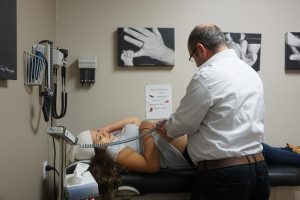 What did we learn?
What did we learn?
- Healthcare providers that are able to foster sincere, non-judgemental, and enjoyable interactions with patients may be more effective in treating pregnant Cree women. Developing strong relationships is crucial to good care and being able to express empathy and understanding.
- Prenatal healthcare providers and staff want and need cultural understanding that is specific to the community. Cultural understanding arises from real experiences and learning from patients over and above relying only on formal cultural security training.
- Good and appropriate care is flexible, all inclusive, and accessible. Healthcare services should meet the specific needs of patients.
The Father’s Study
Very little is known of Indigenous men’s perspectives and experiences during their partner’s pregnancy, therefore we aimed to understand how Cree men support their partners during pregnancy. Six involved and role model fathers from the community of Maskwacîs took part in a qualitative description and four took part in a photovoice project.What did we learn?
- Pregnancy is a chance for Cree men to reclaim roles that have been lost as a result of colonization.
- Men need support to. Without themselves being supported by others they were unlikely to be supportive to their partners.
- Family support was crucial for the men, especially having a stable environment, intact Cree kinships, and strong male role models during their childhood and development.
- Maintaining a connection to faith and traditional culture was an equally significant source of support during the pregnancy.
- Cree fathers play a crucial role in pregnancy but are often left out.
- Attempts to improve prenatal care for Indigenous women need to allow for more inclusion of male partners.
- Incorporating traditional culture and Elder support, flexibility, cultural understanding, and reconciliation into perinatal care approaches may help support and include indigenous men.
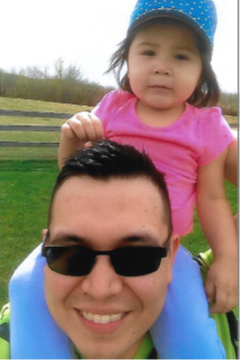 |
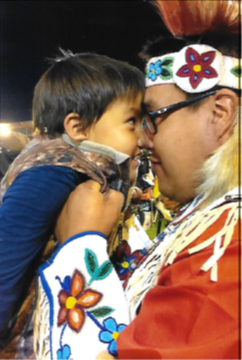 |
|
“It makes me not useless. I feel like I’m doing a good job. Even though I’m unemployed, I feel that I’m doing what I’m supposed to be doing right now. I’m where supposed to be. Obviously being an important person to somebody that needs you, being needed, it gives me purpose.” Read more about this study here. |
“I am exposing them to cultural events, I try to expose my children to the language. I try to tell stories about the land and try to get them to see the world through the lens of a Cree person, and as much as I can I make sure they use correct terms. Like my dad did.” |
The Elder’s Mentoring Program
From our very first Community Advisory Committee, Elders wanted to “act now” and make meaningful and a long lasting positive impacts in their community. Specifically, they wanted to provide programming to support pregnant moms and their partners within the clinical setting by utilizing strengths that already exist in the community. In turn, and Elder’s Mentoring Program was established in partnership with the Wetaskiwin Primary Care Network.The Elder’s Mentoring Program was piloted in 2015, expanded in 2016 and is currently ongoing. Elders from Maskwacîs attend prenatal clinic days at the Primary Care Network and engage with pregnant women and their partners to provide social, emotional, spiritual, and cultural support.
In 2017, the Elders Mentoring Program was evaluated. A total of 14 qualitative interviews were done with staff from the Wetaskiwin PCN, the Elders that facilitate the Program, as well as moms and dads that interacted with the Program.
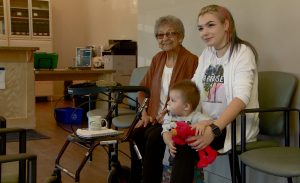
What did we learn?
- The program provides enhanced support networks for parents-to-be. Elder support helps fill in a gap in service that was previously lacking within the prenatal clinical setting.
- The Program helps right historical harms, connects parents to traditional culture, and leads to improved cultural safety in the clinic.
- The program provides a sense of fulfilment and enjoyment among those involved.
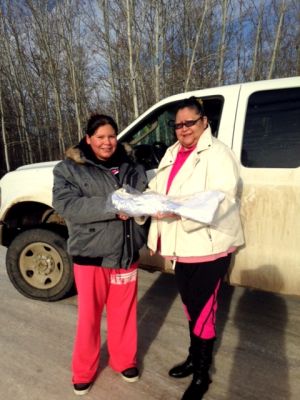
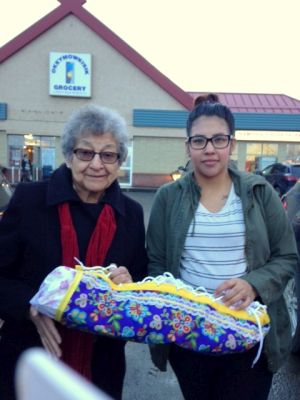
Cultural Sensitivity Interventions
ENRICH graduate student and Maskwacîs community member, Grant Bruno, wanted to give back to his community with his graduate studies. Building off of the initial Health Care Providers study, Grant worked collaboratively with the Wetaskiwin PCN and the community of Maskwacîs to organize and implement a variety of cultural sensitivity interventions for staff members that work with pregnant and postpartum women from the Wetaskiwin Primary Care Network and Maskwacîs Health Service. Activities were designed in collaboration with and facilitated by Elders and community members from Maskwacîs. Activities included lunch and learns where Elders spoke about the history of Maskwacîs and Cree pregnancy, Samson pow wow, a sweatlodge ceremony, and a ceremonial feast.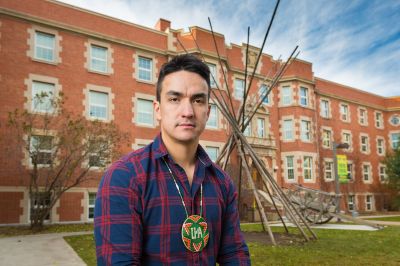
The cultural sensitivity interventions gave staff an opportunity to gain positive cultural understanding of Maskwacîs. The goal of these activities was not only to help educate staff members, but also to create opportunities for open discussion, genuine relationship building, and experiencing Maskwacîs in a positive way. By creating these safe spaces and opportunities for dialogue, we hope to help build healthy and sustainable relationships between the two communities.
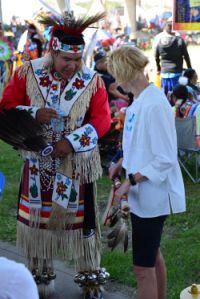
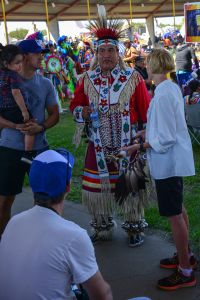
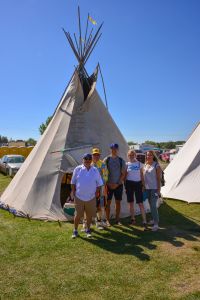
Overall, the cultural sensitivity interventions had positive impacts on the perceptions of the prenatal care staff that were involved. Staff benefited from the personal, relaxed, open, genuine, and sincere nature of the interventions. To read more about this study click here.
In the Media
- The University of Alberta News: Grant Bruno’s Story
- The Wetaskiwin Times feature: Kokums and Mosums helping expectant parents
Related Publications
- Oster RT, Bruno G, Montour M, Roasting M, Lightning R, Rain P, Graham B… Bell RC. (2016). Kikiskawâwasow – prenatal healthcare provider perceptions of effective care for First Nations women: an ethnographic community-based participatory research study.. BMC pregnancy and childbirth, 16 (1), pp. 216
- Oster, R. T., Bruno, G., Mayan, M. J., Toth, E. L., & Bell, R. C. (2018). Peyakohewamak—Needs of involved nehiyaw (cree) fathers supporting their partners during pregnancy: Findings from the ENRICH study. Qual Health Res, , 1049732318794205. doi:10.1177/1049732318794205
